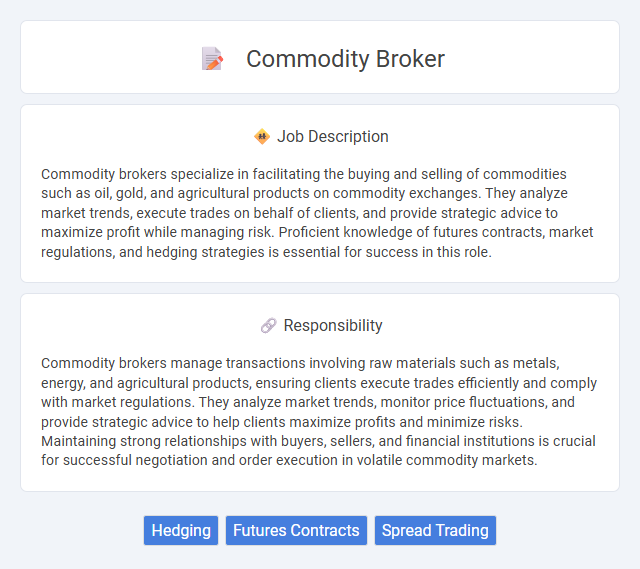
Commodity brokers specialize in facilitating the buying and selling of commodities such as oil, gold, and agricultural products on commodity exchanges. They analyze market trends, execute trades on behalf of clients, and provide strategic advice to maximize profit while managing risk. Proficient knowledge of futures contracts, market regulations, and hedging strategies is essential for success in this role.
People who thrive under pressure and have strong analytical skills are more likely suitable for a commodity broker job. Individuals with high risk tolerance and the ability to make quick decisions may find this career fitting, as the market environment can be volatile and unpredictable. Those who prefer stability and predictable routines might find the demands of commodity trading challenging.
Qualification
A commodity broker typically requires a bachelor's degree in finance, economics, or business administration to understand market dynamics and investment strategies. Professional certifications such as the Series 3 license, regulated by the National Futures Association (NFA), are essential for legally trading futures and commodities contracts. Strong analytical skills, knowledge of regulatory compliance, and proficiency in trading platforms are critical qualifications for success in this highly dynamic industry.
Responsibility
Commodity brokers manage transactions involving raw materials such as metals, energy, and agricultural products, ensuring clients execute trades efficiently and comply with market regulations. They analyze market trends, monitor price fluctuations, and provide strategic advice to help clients maximize profits and minimize risks. Maintaining strong relationships with buyers, sellers, and financial institutions is crucial for successful negotiation and order execution in volatile commodity markets.
Benefit
Commodity broker jobs probably offer significant financial rewards through commissions and bonuses, especially in volatile markets. They might also provide opportunities for professional growth and networking within the global trading community. Access to real-time market data and advanced trading tools could enhance decision-making and increase overall job performance.
Challenge
Commodity broker jobs may involve significant challenges due to volatile market conditions and rapid price fluctuations. The probability of facing high-pressure decision-making situations increases as brokers must analyze vast amounts of data quickly and accurately. Navigating regulatory requirements and maintaining strong client relationships could further test their adaptability and resilience.
Career Advancement
Commodity broker careers offer significant opportunities for advancement through gaining market expertise, building a robust client network, and achieving consistent trading performance. Mastery of commodities markets, including futures, options, and risk management strategies, enhances prospects for promotion to senior broker or portfolio manager roles. Professional certifications such as the Series 3 license and Chartered Financial Analyst (CFA) designation further accelerate career growth within trading firms or financial institutions.
Key Terms
Hedging
Commodity brokers facilitate the buying and selling of futures contracts to help clients hedge against price volatility in markets such as oil, metals, and agricultural products. They analyze market trends and advise producers, manufacturers, and investors on strategies to minimize financial risk associated with fluctuating commodity prices. Effective hedging through commodity brokers protects business cash flows and stabilizes profit margins in volatile trading environments.
Futures Contracts
Commodity brokers specializing in futures contracts facilitate the buying and selling of standardized agreements to purchase or sell commodities at predetermined prices and dates. They analyze market trends, provide clients with timely insights on price fluctuations, and execute trades to maximize profitability while managing risks. Expertise in regulatory compliance and market platforms is essential for navigating the complexities of futures trading.
Spread Trading
Commodity brokers specializing in spread trading execute simultaneous buy and sell orders on related commodity contracts to capitalize on price differentials. They analyze market trends, supply and demand factors, and historical price spreads to identify profitable opportunities while managing risk. Expertise in futures contracts, hedging strategies, and market liquidity is essential for optimizing returns in spread trading within commodities markets.
 kuljobs.com
kuljobs.com